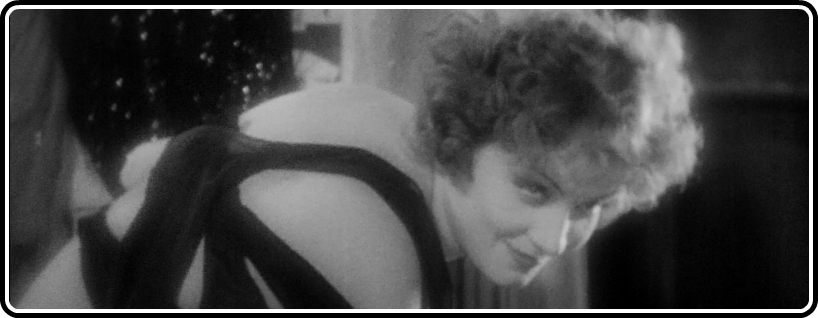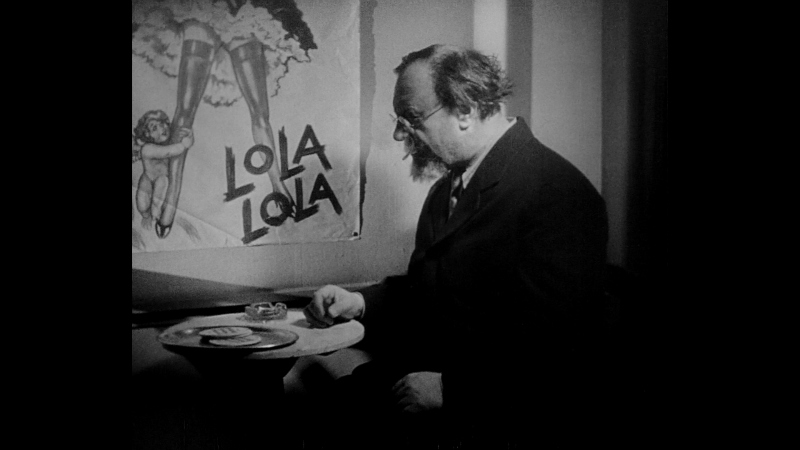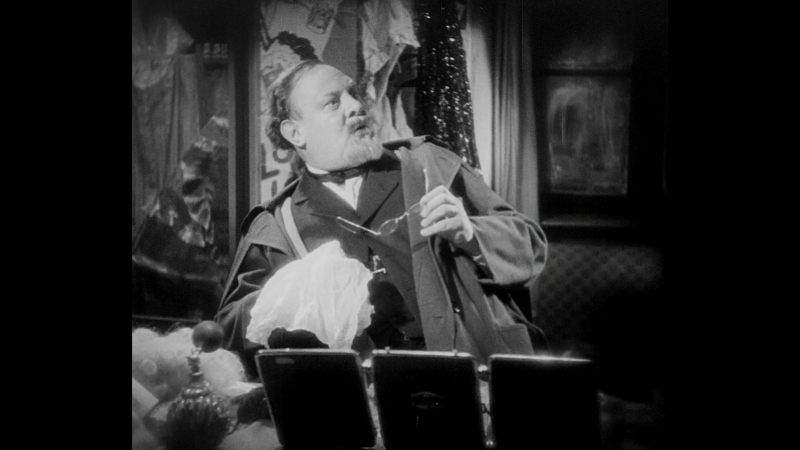
Making a morally-engaged film is no small feat. The temptation to stray towards the didactic or the coldly amoral are too easy, the results too numerous to bother listing. Josef von Sternberg was not a man prone to large statements about humanity or the state of man’s soul, not to the extent of a Bergman or Dreyer, anyway, though the three share more than a few aesthetic concerns. Perhaps that’s why The Blue Angel stands out amongst his filmography. Like so many of his films, it explores human weakness, the unconquerable need for companionship, and the temptation of the flesh, but its structure is so parabolic, its trajectory so plainly laid out from the start, that the film doesn’t account for the incomprehensible depths of a person – these people are who they are, they just might not know it yet. But rather than use that as a crutch or excuse, von Sternberg takes hold of its with a mighty, almost Biblical fury, and the result is quite possibly his best film.
What is most immediately evident is this idea of repression, that this extremely stodgy professor, Immanuel Rath (Emil Jannings), has never been presented with, or allowed himself to even glimpse, an outlet such as the titular nightclub. As soon as he confiscates some postcards from his students, he is drawn in by the image of a woman, Lola, as he plays with some tacked-on feathers meant to show the ease with which her skirt can be blown up. Sternberg carefully teases this until we’re finally given, head-on, the image of Marlene Dietrich in the role of a lifetime, not only for the exposure it granted her, not only for the partnership she immediately formed with her director, who would take her to America and make of her an even bigger star, but for the singularity with which that image – at once brash, defiant, and generous against a swarm of oglers – would complete define her screen persona. Immanuel’s downfall is pitiable enough, but for her to fall for anything less than a Dietrich would be pathetic; someone of her charms could bring a bishop to his knees, so to speak.
Watching it again, however, I was struck by something altogether different, a theme that admittedly would not have been on the minds of many in 1930, and which was probably unintended by its authors, but which in modern times has taken on a sort of exaggerated importance – sexual addiction. Immanuel is given several opportunities to stall his downfall, but at every turn, succumbs to his desires. These are not the actions merely of a man who has discovered his sexuality late in life, but rather of a man who cannot control them, and who disregards even his own questions of them, until he inevitably hits the most heartbreaking form of rock bottom I’ve ever seen depicted onscreen. It’s a portrait as terrifying as it is tragic, better crystalizing in a much simpler form what Steve McQueen achingly strives for in 2011’s still-pretty-damn-good Shame. Jannings was felt to be, at the time, the greatest actor around, and this is as good an argument for that case as you’re likely to find, so overly theatrical but so deeply honest and open.

Masters of Cinema’s new Blu-ray release of Sternberg’s masterpiece is pretty grand, giving us high-definition transfers not only of the original, canonical German version, but also its English-language counterpart (for your relative who’s always wondering if an English version of a subtitled film exists, boy was the early sound era for them!). The image on both is stellar, though I’d give a slight edge to the English version (it’s undoubtedly received less wear-and-tear over the years), though the sound track for the latter is in much worse shape, making the already difficult-to-decipher German accents even harder to contextualize. The English language version has a bit more depth and dimension, is a little brighter, and suffers less immediately-visible damage, though the German version is hardly a train wreck. It still bears all the hallmarks of a great, filmic presentation.
In terms of special features, well, even if two versions of the film aren’t enough, this disc has you covered there, too. First, for those who are as fond of them as I, there’s a very fine commentary track (on the German version) by film critic Tony Rayns. It’s a standard scholarly track in terms of format, taking us through the various noteworthy historical, aesthetic, and thematic elements of the film, but for those of us who are into that kind of thing, never tiring. Tag Gallagher contributes one of his characteristically great video essays, covering a whole range of topics inside of thirty minutes, and presenting some footage, particularly of Germany cinema during the Nazi era, that I can safely say I probably would have never seen otherwise.

We also get a truly revelatory screen test of Dietrich circa 1929, which shows not just what von Sternberg saw in her acting, appearance, and singing, but her interaction with the piano player must have been the element that sealed the deal. It’s almost worth the price of the disc alone, though I’m sure if one were so inclined, one could find it elsewhere. There’s a very brief clip from a 1971 interview with the star, as well as clips from concerts she performed in 1963 and 1972, which wasn’t even a thing I knew she did, so hey, that was neat.
And finally, Masters of Cinema treats us to their standard, always-amazing booklet, this time stocked with the words of the filmmaker himself, Josef von Sternberg, in the form of a long piece that served as the introduction to the shooting script, published in 1968. The nearly forty years that had passed since the film’s release gives him more than enough room to reflect on his own mindset in making the film, and the various personalities that clashed in making it. Emil Jannings personally requested von Sternberg to direct him in his first “talkie,” but the director had such an awful experience working with him on The Last Command that he refused immediately, and the way their relationship developed from there is certainly of interest. Von Sternberg has famously refused credit for giving the world Marlene Dietrich, though he ducks his own humility in just the right way. Anyway, it’s a great read by a man who could tell a story in any format. There’s also a timeline of the film’s production and release that is shoved to the back of the booklet, but may be helpful to read first before diving into any of the special features, in order to establish some context.
All told, this is one of my favorite packages from Masters of Cinema, and certainly in early running for the best disc they’ll release all year. Let it be a sign of things to come, but for now, do not hesitate in buying it. A landmark film in such a stacked edition deserves to be on your shelf.
Buy The Blue Angel from Amazon UK



![Bergman Island (The Criterion Collection) [Blu-ray]](https://criterioncast.com/wp-content/uploads/2022/11/bergman-island-the-criterion-collection-blu-ray-400x496.jpg)
![This Is Not a Burial, It’s a Resurrection (The Criterion Collection) [Blu-ray]](https://criterioncast.com/wp-content/uploads/2022/11/this-is-not-a-burial-its-a-resurrection-the-criterion-collection-blu-ray-400x496.jpg)
![Lars von Trier's Europe Trilogy (The Criterion Collection) [The Element of Crime/Epidemic/Europa] [Blu-ray]](https://criterioncast.com/wp-content/uploads/2022/11/lars-von-triers-europe-trilogy-the-criterion-collection-the-element-of-400x496.jpg)
![Imitation of Life (The Criterion Collection) [Blu-ray]](https://criterioncast.com/wp-content/uploads/2022/11/imitation-of-life-the-criterion-collection-blu-ray-400x496.jpg)
![The Adventures of Baron Munchausen (The Criterion Collection) [4K UHD]](https://criterioncast.com/wp-content/uploads/2022/11/the-adventures-of-baron-munchausen-the-criterion-collection-4k-uhd-400x496.jpg)
![Cooley High [Criterion Collection] [Blu-ray] [1975]](https://criterioncast.com/wp-content/uploads/2022/11/cooley-high-criterion-collection-blu-ray-1975-400x496.jpg)
I watched this for the first time last year in my German Film class. Thanks for writing a review of this–I am still building my Criterion collection and have been ambivalent about whether or not to start a Masters of Cinema collection as well, but this might do it for me.